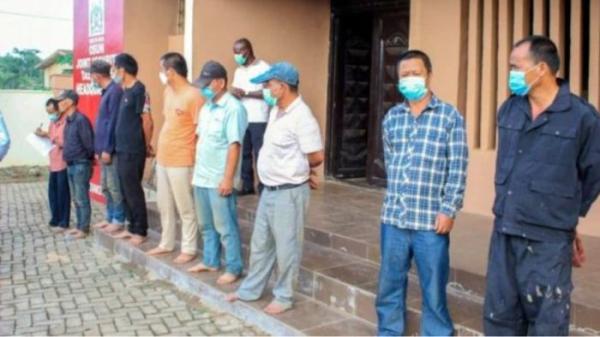
Islamic State insurgents pushed on with their assault on a Syrian border town on Thursday despite coalition air strikes meant to weaken them, sending thousands more Kurdish refugees into Turkey and dragging Ankara deeper into the conflict.
Kurdish militants warned that peace talks with the Turkish state would come to an end if the Islamist insurgents were allowed to carry out a massacre in the predominantly Kurdish town of Kobani, pressuring Ankara to act.
Islamic State fighters have taken control of hundreds of villages around Kobani, beheading civilians in a bid to terrorise villagers into submission, and have advanced to within kilometres of the town on three sides.
In neighbouring Iraq, the insurgents have carried out mass executions, abducted women and girls as sex slaves, and used children as fighters in systematic violations that may amount to war crimes, the United Nations said.
U.S. led forces, which have been bombing Islamic State targets elsewhere in Syria since last week as well as in Iraq, hit a village near Kobani on Wednesday and strikes were reported further south overnight, Kurdish sources in the town said.
But they seemed to do little to stop the Islamists' advance.
"We left because we realised it was only going to get worse," said Leyla, a 37-year old Syrian arriving at the Yumurtalik border crossing with her six children after waiting 10 days in a field, hoping the clashes would subside.
"We will go back tomorrow if Islamic State leaves. I don't want to be here, I had never even imagined Turkey in my dreams before this," she said.
The Britain-based Syrian Observatory for Human Rights, which monitors Syria's war, said heavy clashes between Islamic State and Kurdish YPG fighters had been continuing on Kobani's eastern and southeastern outskirts for the last 36 hours.
The sound of a large explosion was heard around midnight at the same time as coalition planes were flying overhead, it said.
About 20 explosions were also heard in the areas of the Tishrin dam and town of Manbij roughly 50 km (31 miles) south of Kobani, resulting from missile strikes believed to be carried out by the coalition, the Observatory said.
Asya Abdullah, a senior official in Syria's dominant Kurdish political party the Democratic Union Party (PYD), said there were clashes to the east, west and south of Kobani and that Islamic State had advanced to within 2-3 km on all fronts.
"If they want to prevent a massacre (the coalition) must act much more comprehensively," she told Reuters by phone from Kobani, adding that air strikes elsewhere in Syria had pushed Islamic State fighters towards the border town.
"We've been fighting ISIS with all our strength for 18 days to save Kobani. We will continue the resistance ... It’s civilians who will die if Kobani falls. But we will protect them."
Pressure On Turkey
Turkey's parliament will vote later on a motion which would allow the government to authorise cross-border military incursions against Islamic State fighters in Syria and Iraq, and allow coalition forces to use Turkish territory.
But President Tayyip Erdogan insists air strikes alone will not contain the Islamic State threat and is calling for the ouster of Syrian President Bashar al-Assad, an aim not shared by the U.S.-led military coalition.
Turkey accuses Assad of stoking the growth of Islamic State through sectarian policies and believes the stability on its 900 km (560 mile) border will only deepen if he clings to power.
It is also reluctant to take action that may strengthen Kurdish fighters allied to the Kurdistan Workers Party (PKK), a militant group that has fought the Turkish state for three decades and with which it is conducting fragile peace talks.
"If this massacre attempt achieves its goal it will end the process (with Turkey)," PKK leader Abdullah Ocalan said in a statement released by a pro-Kurdish party delegation which visited him on Wednesday in his island prison near Istanbul.
"I urge everyone in Turkey who does not want the process and the democracy voyage to collapse to take responsibility in Kobani," he said in the statement.
Kurdish forces allied to the PKK, the People's Defence Units (YPG), are fighting against the Islamic State insurgents attacking Kobani. The PKK is designated a terrorist group by Turkey, the United States and European Union.
German lawmaker Rolf Muetzenich, a foreign and security policy expert in the lower house for the Social Democrats (SPD) - junior partners in the ruling coalition - said in a radio interview he worried that Turkish intervention in Syria could end up targeting the PKK and become "an additional conflict accelerator in an already unpredictable situation".
"EXISTENTIAL THREAT" TO TURKEY
Islamic State has carved out swathes of eastern Syria and western Iraq in a drive to create a cross-border caliphate between the Euphrates and the Tigris rivers, terrifying communities into submission by slaughtering those who resist.
Iraqi Kurdish troops drove Islamic State fighters from a strategic border crossing with Syria on Tuesday and won the support of members of a major Sunni tribe, in one of the biggest successes since U.S. forces began bombing the Islamists.
But militants took control of most of the western Iraqi town of Hit in Anbar province early on Thursday, security sources and local officials said. Most of the surrounding towns in Anbar province have already fallen under Islamic State control.
The United States has been carrying out strikes in Iraq against the militant group since July and in Syria since last week with the help of Arab allies. Britain and France have also struck Islamic State targets in Iraq.
But Islamic State fighters on the border with Turkey, which hosts a U.S. air base at its southern town of Incirlik not so far used in the air strikes, have yet to be dislodged.
"(Islamic State) is Turkey's greatest existential threat since 1946, when Joseph Stalin demanded that Ankara cede control of the Bosphorus and other territory to the Soviet Union," said Soner Cagaptay, director of the Turkish Research Program at The Washington Institute.
"Erdogan and Prime Minister Ahmet Davutoglu know that only the United States has the necessary military hardware and intelligence assets to defeat ISIS in the long term," he said, forecasting that while Turkey would offer logistics and intelligence support, it was unlikely to wholeheartedly back a military strategy that does not target Assad.
Erdogan said on Wednesday that Turkey's priority was also to enable the 1.5 million refugees it has taken in from Syria's conflict to return home. He has been pushing for a no-fly zone enforced by the U.S.-led coalition to protect a safe haven on the Syrian side of the border where refugees could be sheltered, an idea that has yet to gain traction in Washington.
More than 150,000 refugees have fled Kobani over the past two weeks alone, with a steady exodus continuing. Officials from Turkey's AFAD disaster management agency said some 4,000 crossed on Wednesday, and a similar figure the day before.
Reuters






















